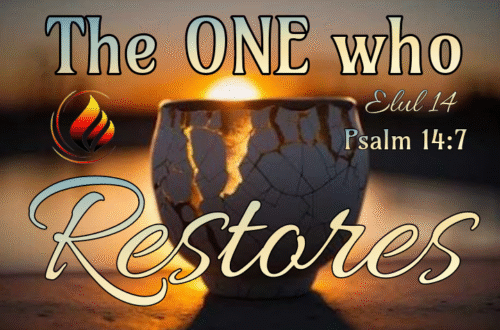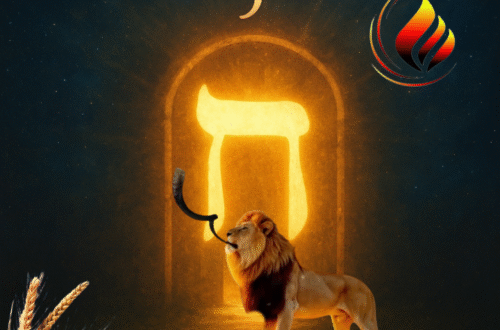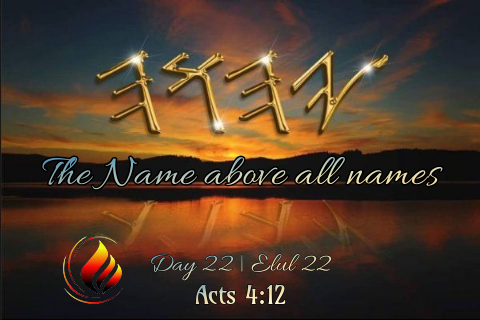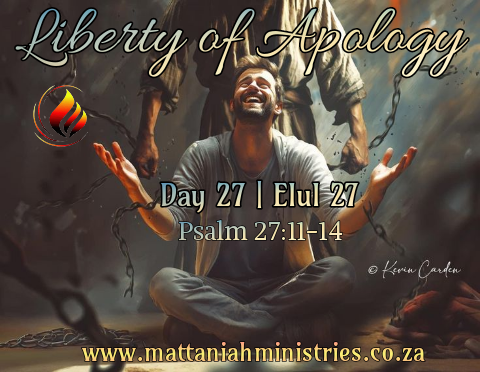
Day 27 (Elul 27) – Liberty of Apology
MODEH ANI – MORNING PRAYER
The darkness of night fades gently away, as the light awakens creation with its song of praise to You the Holy, Almighty YAHUAH—the Eloah of Abraham, Isaac, and Jacob—the great “I AM,” Who was, Who is, and Who forever will be, the only living and life-giving Elohim.
Abba YAHUAH, thank You for stirring my soul to rise into a new opportunity, to sit at Your feet and learn what rests upon Your heart. Wash me with Your Word, anoint me with Your Ruach HaKodesh, and drench me in the wisdom that flows from Your throne.
Lead me into Your secret place, where You tenderly work in the soil of my soul. As we draw near to Your appointed feasts, prepare me, cleanse me, and shape me as a vessel for Your glory. In the wonderful and beautiful Name of YAHUSHUA—HalleluYAH!
https://mattaniahministries.co.za/2025/08/24/the-morning-prayer-the-modeh-ani/
REFLECTION: Progression to Purification
As we journey through this season of purification YAHUSHUA, the KING in the field, gently exposes the areas of our lives that need to be surrendered. Habits, patterns, and sins that have taken root are brought into the light, and we are invited to turn away from them, to repent, and to allow our soul-soil to be renewed. These 40 days are a tender, loving work of purification, shaping us and preparing us for the days ahead.
In the midst of this process, it becomes clear how often we overlook the simple yet profound act of apology. We may ask for forgiveness, yet fail to truly apologize—to pause, reflect, and express genuine sorrow for the ways we have strayed. Apologizing is more than words; it is humility in action, an acknowledgment that our choices have consequences and that growth requires honest reflection.
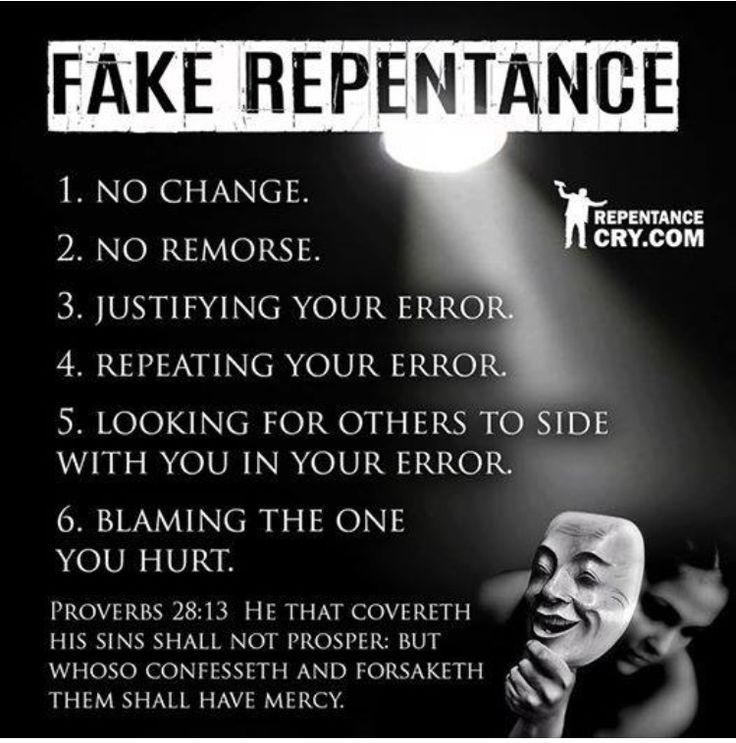
Through reflection, patterns emerge—habits that need correction, ways of thinking that need reshaping. Apologizing does not erase guilt before YAHUAH, but it opens the door to love, reconciliation, and deeper spiritual maturity. It is an action of liberty, to apologize brings freedom.
And as we consider this, it becomes strikingly clear: if we cannot offer a sincere apology to YAHUAH, how can we offer it to one another? The act of apology, like repentance, draws us closer to the heart of the KING and begins to align our lives with His ways.
TESHUVAH Return: Never Forget True Regret
In the quiet of this moment, we turn our hearts toward YAHUAH, noticing where our thoughts, words, and deeds have strayed. We bring them gently into His light, offering sincere apologies from the depths of our souls.
Then we ask ourselves if our words carry the weight of true regret, or if they drift lightly without change. A genuine apology bends the heart, softens the spirit, and makes room for forgiveness to flow. Where we have wounded others, we imagine extending the same humility and care, seeking to restore what has been broken.
Step by step, we consider how to walk differently—leaving behind old patterns, embracing His ways, nurturing habits that bear His fruit. Each intentional act becomes a thread in the tapestry of Teshuvah, weaving renewal, transformation, and a life shaped ever more fully by righteousness, love, and the gentle guidance of the KING in the field, or Beloved YAHUSHUA.
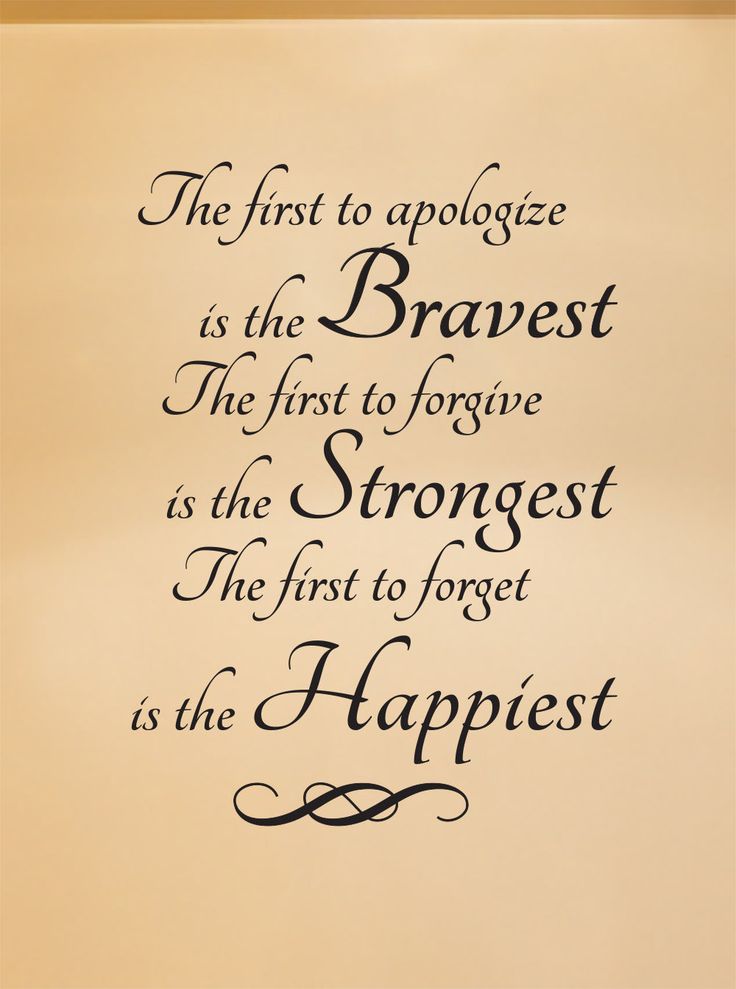
Apology and repentance are woven together. Teshuvah is the sacred step of return, but within it, a heartfelt apology to the Most High, Almighty Eloah becomes a key of freedom. In humbly confessing and expressing sorrow, the soul is released, and the heart is drawn closer to His embrace.
BERACHAH Blessing: Kickstart the Transformation of the Heart
The Barachah in sincere Teshuvah and heartfelt apology is a heart softened and aligned with YAHUAH’s ways. When we humbly acknowledge our missteps and turn from them, forgiveness flows freely—YAHUAH’s mercy restores the soul, cleansing the heart and releasing it from guilt and shame.
Each act of humility and repentance strengthens our character, producing fruits of righteousness that blossom in our lives. Apologizing and returning to Him opens the door to deeper intimacy with our KING, who delights in our sincere return. Relationships are restored, both with YAHUAH and, when needed, with others, bringing healing and reconciliation where there was brokenness.

A repentant heart becomes fertile soil, and blessings multiply, touching not only our own lives but also the lives of those around us in alignment with His divine purpose. The Barachah is not merely relief from wrongdoing—it is a transformation of the heart, a spiritual renewal that positions us for favor, guidance, and the profound blessings reserved for those who genuinely return and walk in harmony with the KING.
SCRIPTURE:
While I was busy with this devotion of also apologizing to YAHUAH, I discovered that in Biblical Hebrew, there isn’t a single word that exactly corresponds to the modern sense of “apologize” as saying “I’m sorry.” Instead, the concept is expressed through words of confession, repentance, and turning back (Teshuvah).
Very interesting is that I could also not find one Scripture referring to someone who apologized to Abba Father. The Observation I made is it’s not just saying “sorry” but acknowledging wrongdoing, feeling remorse, and committing to change and in the Bible, apologizing to YAHUAH is always linked with Teshuvah (turning away from sin).
If you find a Scripture that can link to an apology to YAHAUH, please type it in the comments below. I would love to hear from you and learn along the path with the KING in the field.
STRONGS references and Hebrew words connected to APOLOGY
In Biblical Hebrew, there isn’t a direct single verb that exactly means “to apologize” the way we use it in English. Hebrew expresses the idea through related concepts like confessing, asking forgiveness, or seeking pardon.
Here are the main words used:
- להתנצל (lehitnatzel) – Modern Hebrew
- This is the most common modern word for “to apologize.”
- Example: אני מתנצל (ani mitnatzel) – “I apologize” / “I’m sorry.”
- סלח (salach) – Biblical Hebrew root meaning “to forgive.”
- While it refers more to granting forgiveness, it’s often connected to apology.
- התודה (hitvadah) – “to confess, to admit.”
- Root: ידה (yadah, to acknowledge/praise/confess).
- In Scripture, confession before YAHUAH is part of repentance (teshuvah), which often functions as an apology to Him.
So in a Biblical/Spiritual context, an apology is usually expressed through:
✅ So in a Biblical framework:
- Hitvadah (confession) = admitting fault (apology).
- Teshuvah (repentance/return) = action of turning back.
- Salach/Selichah = forgiveness granted by YAHUAH.
PSALM 27:11-14
While I was still pondering this topic and waiting to hear from Father which Scripture would connect with today’s devotion, I received a WhatsApp message and since we are on DAY 27, I felt prompted in the Spirit to share it with you:
“Teach me Your way, O YAHUAH, and lead me in a level path, because of those who watch me. Do not give me into the soul of my foes; for false witnesses have risen up against me, and the ones breathing out violence. I would have fainted unless I had believed to see the goodness of YAHUAH in the land of the living. Hope in YAHUAH; be strong and He will make strong your heart; yea, hope in YAHUAH.” (Psalm 27:11-14)
PRAYER
Abba YAHUAH, my heart breaks into pieces as I realize that I have never sincerely apologized to You for the wrongdoings and sins I have committed in the past. Father, I know I am washed by the Blood of the Lamb, YAHUSHUA, and that You have forgiven me for all my iniquities, but today I want to offer a heartfelt apology for my sinful behavior. As I look back, I feel true remorse, and I am deeply sorry that it has taken me so long to stand here today and apologize to You.

Father I know You love me unconditionally and that You will accept my apologies with open arms. Thank You for granted me this opportunity to offer my apology and that You will graciously accept it. In the beautiful Name of YAHUSHUA – HALLELUYAH!
EXTRA TEACHING: THE SECRET RAPTURE (Part 2)
As we are entering into the next BIBLICAL MONTH (Month 7 | Tishri) in a few days, I will share the teachings and prophetic word that NataliYAH/Esther released form “The Voice Calling in the Wilderness Ministries” regarding YOM TERUAH and the rapture.
Teshuvah [תשובה] brings Berachah [ברכה], the blessing of our King.
Shalom,



